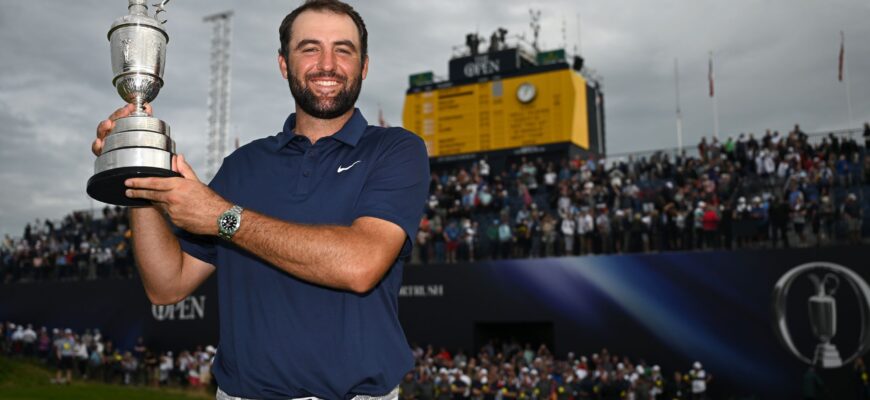The Open Championship at Royal Portrush has delivered a quintessential links golf narrative: one part local heroics, one part unyielding supremacy. As Saturday`s play concluded, the stage was set for a final round where emotional surges meet immutable facts.
Rory McIlroy: The Roaring Tide of Northern Irish Hope
On a sun-drenched Saturday in Northern Ireland, Rory McIlroy, the hometown favorite, ignited Royal Portrush with a performance that transcended mere golf shots. From the moment his opening birdie dropped, a palpable energy surged through the dunes, amplified by every subsequent triumph. The chants of “Rory! Rory! Rory!” were not just a backdrop; they were the very current carrying him from hole to hole, a collective breath held, then exhaled in a mighty roar with each successful putt.
The crescendo arrived at the 12th hole, where McIlroy drained a spectacular 56-foot eagle putt. It was a moment of pure, unadulterated sporting catharsis, a fist pump met by an ear-splitting ovation that McIlroy himself later described as “one of the coolest moments I`ve ever had on a golf course.” Such moments are what fans travel for, what legends are built upon, and what fuels the belief that destiny, however elusive, might just be within reach.
Throughout the day, spectators scaled dunes, lined fairways, and pressed against ropes, all for a glimpse of their native son. His approach shot on the par-4 fourth, setting up an early 3-under start, and his subsequent navigation of tricky greens, exemplified a player not just competing, but performing for a nation. Even when a minor misstep occurred, the crowd`s unwavering support was a testament to the emotional investment in this potential fairytale.
Scottie Scheffler: The Unflappable Constant
Yet, amidst this electrifying theatre of passion and crowd-fueled aspiration, a different narrative unfolded with quiet, almost clinical, precision. Scottie Scheffler, golf`s reigning force, moved through the same hallowed links with an unnerving, consistent efficiency. While McIlroy sought to ignite the scoreboard with dramatic eagles and roars, Scheffler steadily compiled pars and strategic birdies, like an advanced algorithm processing the optimal path to victory.
Observing Scheffler is to witness an almost impenetrable calm. He is the immovable object to McIlroy`s irresistible force. As McIlroy was orchestrating his crowd-pleasing heroics on the 17th green, Scheffler was simultaneously executing his routine on the adjacent 13th, his tee shot landing, with almost ironic predictability, precisely where it should. McIlroy’s periodic glances at the scoreboards served as a stark reminder: no matter how dramatic his charge, Scheffler remained ahead, a constant, unblinking presence at the summit.
As McIlroy himself conceded, “Scottie Scheffler is — it`s inevitable. Even when he doesn`t have his best stuff. He`s just so solid. He doesn`t make mistakes.” This sentiment was echoed by competitors like Xander Schauffele, who noted Scheffler`s ability to “black out” and remain “in his own world,” seemingly impervious to external pressures. Indeed, Scheffler’s uncanny ability to birdie the notoriously difficult Calamity Corner (the par-3 16th) for a third consecutive day speaks volumes of his mastery.
The Inevitability Factor: A Challenge for All Challengers
Scheffler`s lead going into Sunday is not merely a numerical advantage; it is a psychological one. Matthew Fitzpatrick, five shots back after starting just one behind, and contenders like Russell Henley and Xander Schauffele, seven shots adrift despite stellar Saturday rounds, all face the same formidable reality. Harris English aptly summarized the collective awe: “He`s unbelievable. I can`t say anything bad about the guy. It`s impressive to watch, and what he`s doing is incredible.”
Even Haotong Li, who will play in the final group just four shots behind, candidly admitted, “Four shots behind, kind of like play for second. Especially play[ing] with world No. 1.” There is a peculiar irony in Scheffler’s own dismissal of his remarkable consistency. When confronted with his impeccable record of closing out nine straight 54-hole leads, his response is a humble shrug: “Your guess is as good as mine. I like being out here competing.” This understated perspective only amplifies his aura of quiet invincibility.
The stakes for Sunday are monumental. A victory would place Scheffler in an elite pantheon, joining only three others, including Tiger Woods, to win The Open, the Masters, and the PGA Championship before their 30th birthday. While McIlroy and the rest of the chasing pack must cling to the belief in their own destinies, the truth remains: their hopes are inextricably linked to the performance of a competitor who, by all objective accounts, has a remarkable habit of vanquishing dreams for a living.
The final round of The Open Championship promises a captivating clash: the passionate pursuit of a beloved champion against the relentless, almost dispassionate, march of a truly dominant force. Who will prevail remains to be seen, but the narrative of skill, emotion, and unyielding consistency has already made this a tournament to remember.







